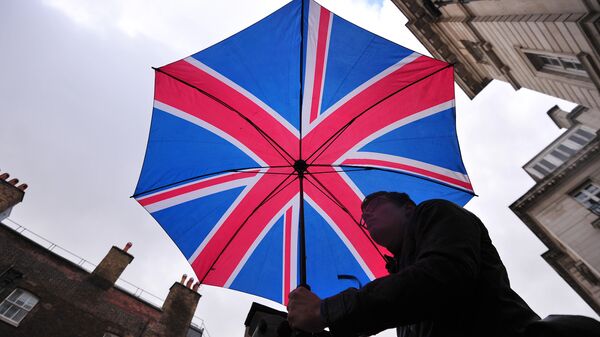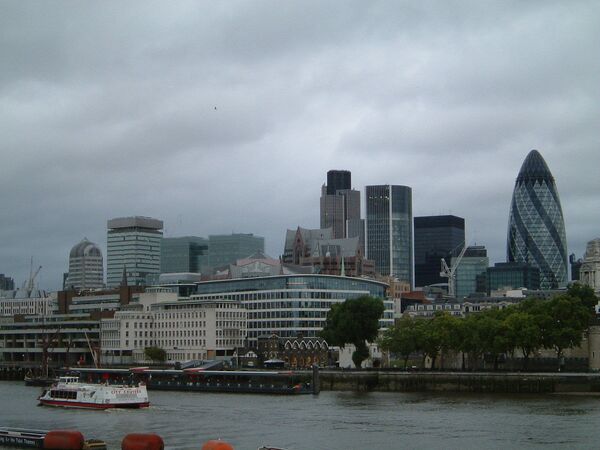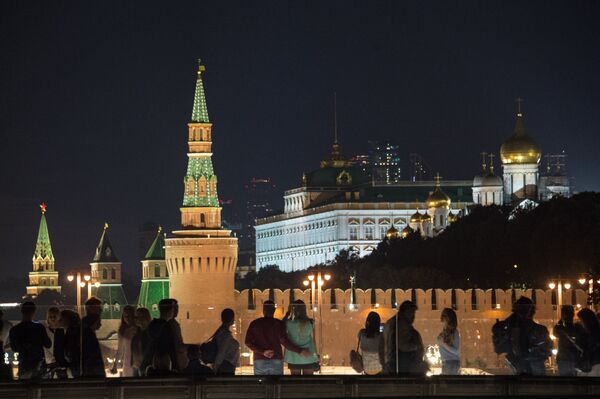British Prime Minister Boris Johnson has played down the prospects of a breakthrough in Brexit negotiations to avoid a hard British exit from the EU, recently urging Britons not to “get their hopes up too soon” and clashing with European Council President Donald Tusk about which one of them might go down in history as “Mr. No-Deal Brexit” if negotiations fall through.
But it’s not all doom and gloom. Last fall, the Russian Embassy in London predicted that the UK’s divorce from the European Union may actually be a starting point for the UK toward “building new, more beneficial economic relations with the outside world, including Russia.”
Doubling Trade: A Real Possibility
Indeed, despite recent tensions between Moscow and the London on issues ranging from Ukraine and Syria to NATO troops along Russia’s borders, to last year’s poisoning of a former GRU officer in south England, bilateral trade relations between the two countries have actually been growing, with trade turnover rising nearly 8 percent in 2018 and reaching the equivalent of about $13.7 billion, according to Russian Embassy figures.
Furthermore, according to Russian Trade Delegation in the UK estimates, trade can easily reach pre-2014 Ukraine crisis levels and top the $26 billion mark by 2024, given the expected downturn in the UK’s trade with the EU after Brexit and the cross compatibility of what the two countries have to offer one another commercially. Last year, Russia became the UK’s 11th largest trading partner overall outside the EU, while imports from Russia ranked 8th outside the EU and 16th overall. Between January and November of 2018, Russia ranked first in terms of total growth in trade among the UK’s top 20 trade partners.
Steve Keen, a London-based economist, honourary University College London professor, and author of the popular book ‘Debunking Economics’, said there are several areas of potential cooperation Russia and the UK may be looking to take advantage of post-Brexit.
“The UK will be looking for trade partners for its exports that might suffer from Brexit, and the main area of interest to them [as far as Russia is concerned] will probably be pharmaceuticals,” Keen said.
Meanwhile, in its search for suppliers which can replace at part of its current basket of imports from Europe, the UK may also turn to Russia for other goods, such as some food products, as well as steel, Keen added.
The “easiest” way for the UK to try to make up for losses from Brexit will be tourism, according to the economist, “especially if the pound declines in value, as it almost certainly will.” Therefore, in the immediate post-Brexit period, Keen suggested that it’s likely that the UK will ease its visa regime with Russia and other countries in a bid to attract some much-needed tourist cash.
As far as investments are concerned, the UK is already one of the top ten largest foreign investors in Russia, with accumulated assets standing at over $23.8 billion, while Russian companies have about $11 billion parked in the British economy. The Russian Trade Delegation also estimates that there are well over 600 British companies, big and small, operating in Russia, while about 100 Russian firms do business in the UK, with potential for further growth.
For example, BP, Unilever, AstraZeneca, and other major UK companies maintain a highly visible presence on the Russian market, while over 60 Russian firms, from Gazprom and Sberbank to Norilsk Nickel and PhosAgro, are listed on the London Stock Exchange.
UK retailers in Russia welcome to join 200 #Russian peers at #RedisBusinessClass event to discuss the latest trends and challenges in #retail and benefit from networking.
— Dept. Int. Trade RUS (@tradegovukRUS) 2 августа 2019 г.
4 September, Moscow
More details 👉 https://t.co/JzfrWyoAAz contact us for a promo code! pic.twitter.com/LUnHD04ZkG
Russia’s Exports: Not Just Oil and Gas
Of total Russian exports to the UK worth $9.7 billion in 2018, some $2.2 billion, or about 22 percent, were from non-energy and natural resources categories, the Russian Export Center, a Russian government-supported export support organisation, has calculated.
And Russia is looking to take account of the needs of Western countries, including the UK, for non-hydrocarbons, non-raw materials exports such as vehicles, machine tools, high quality food items, etc., with a broad assortment of Russian industrial, agricultural, construction-related and other products featured in the Export Centre’s ‘Made in Russia’ programme, aimed at improving the recognition of Russian brands and products in foreign markets.
The two countries already have a rich history of trade in advanced industrial and finished goods, with such economic cooperation weathering political and diplomatic conflicts even during the Cold War. Through the 1970s and 1980s, the USSR delivered machine building tools, electro-motors, tractors, household appliances, and famously, Lada automobiles to the UK. The UK, meanwhile, exported everything from vehicles and machine tools, to industrial goods for the chemical industry the other way. Similar synergistic opportunities are possible today.
3⃣ 🇷🇺 Russian companies from #Voronezh region will participate in @SPE_OE in 🏴Aberdeen, 3-6 September. #Next-Trade, #ZNIGO and #KNG are three national leaders in oil&gas equipment sector. Make sure you meet them at 1K79 pavilion #speoffshore #oil&gas pic.twitter.com/44QVRDpqf4
— Trade Delegation of Russia in the UK (@RusTradeUK) 29 августа 2019 г.
Opportunity for Britain’s Reindustrialisation?
The estimated $4.06 billion in British exports to the Russia in 2018 included an array of complex industrial and knowledge-based products, including vehicles (40 percent), energy generation equipment (29 percent), pharmaceuticals (12 percent), and electrical machinery and equipment (10 percent).
If London seeks to borrow a page from President Trump’s playbook and to make an effort to rebuild Britain’s industrial base in the coming years to compete with Europe, China and the United States, cooperation with Moscow on this front would be a must, as Russia is able to provide the country with virtually all the necessary natural resources, energy, steel, and other materials, complementing this with the above-mentioned industrial goods as Russia works to expand its producers’ visibility.
Christopher Bovis, a professor of international business law at the University of Hull, said that Russia may very well benefit from what he described as “a new era in business relations” with the UK post-Brexit, given that London will be looking to create a new “broad-reaching trade and business framework on a reciprocal basis.”
According to Bovis, there are “three horizons” for Russian-UK economic cooperation, including energy and other resource-based export-import, trade in manufactured goods, and services.
“The UK needs energy and other resource-based imports to support its industrial base post-Brexit. Russia appears as the biggest winner, if such cooperation materialises,” Bovis explained. “Second, manufacturing represents a great opportunity to evolve Russian-British trade and business cooperation. Russia has many manufacturing sectors which are competitive and advanced and the UK could be a big market for exports. Thirdly, the services sector reflects the biggest potential in any future Russian-British trade and business cooperation. Services represent a large portion of domestic economies and access to the relevant markets and are regarded as the prime benefit of any international trade agreements.”
Economics as a Basis for Normal Relations
Speaking at the fourth Russian-British Business Forum in London last November, Russian Ambassador to the UK Alexander Yakovenko said that amid the strain in bilateral relations between the two countries, the growing economic ties were “probably the most important part of today’s relations.”
Indeed, it can be said that the economy could very well be the basis of restoring trust, decreasing tensions and finding points of contact in resolving conflicts. According to Dr. Bovis, it seems likely that the new, post-Brexit era “will herald a new geopolitical approach between the two countries,” with this having a number of positive knock-on effects, including everything from increased trade and economic cooperation to tourism and the associated economic benefits.
Ultimately, speaking at last year’s Russian-British Business Forum, Charles Hendry, president of the Russo-British Chamber of Commerce, emphasised that whatever happens after Brexit, the potential partnership with Russia is one the UK can’t afford to discount.
“The economic gain from Brexit, if there is one, is for the UK to find new trading partners around the world…and you cannot ignore a market the size of Russia,” he said.





